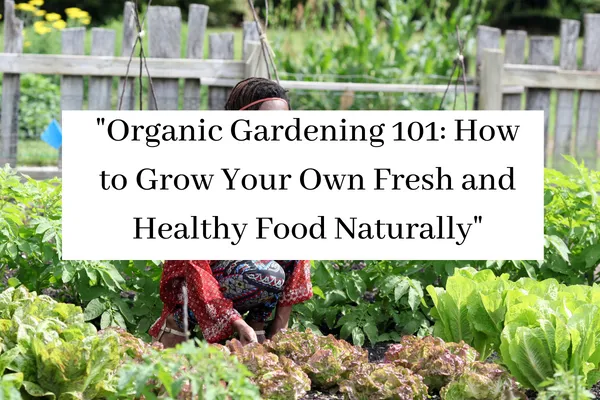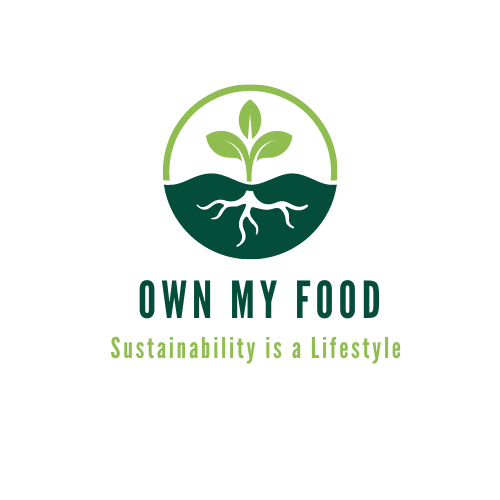
Own My Food Blog Posts:

"Organic Gardening 101: How to Grow Your Own Fresh and Healthy Food Naturally"
“Grown without pesticides. The way nature intended.”
Introduction:
Organic gardening is a method of growing plants and vegetables without the use of synthetic pesticides, fertilizers, or other chemicals. Instead, organic gardeners rely on natural methods to promote healthy growth and protect plants from pests and disease.
One of the biggest benefits of organic gardening is the ability to grow fresh, healthy food right in your own backyard. Organic produce is often more nutritious than conventionally grown produce, and it can also be much tastier. In addition, by growing your own food, you can be sure that it is free from harmful chemicals and genetically modified organisms (GMOs).

With that said, here is "Organic Gardening 101: How to Grow Your Own Fresh and Healthy Food Naturally!" 🌳
Before you begin your organic garden, it is important to plan it out properly. First, choose a location that gets plenty of sun and has well-drained soil. You will also want to consider the size of your garden and how much time and effort you are willing to put into it.
Once you have a plan in place, it is time to start preparing the soil. Organic gardening relies on healthy, living soil, so it is important to add organic matter to your soil to improve its structure and fertility. This can include things like compost, well-rotted manure, or leaf mold. You may also want to consider using a soil test kit to determine the pH level of your soil and make any necessary adjustments.
Next, it's time to choose the plants you want to grow. When selecting plants, it is important to choose varieties that are well-suited to your climate and soil. You will also want to consider the amount of space you have available, as well as how much maintenance each plant will require. Some popular organic gardening choices include tomatoes, peppers, cucumbers, and herbs.
Once your plants are in the ground, it is important to keep them well-watered and fertilized. Organic gardening methods typically rely on natural fertilizers, such as fish emulsion or bone meal, to provide plants with the nutrients they need. It's also important to keep an eye out for pests and diseases, and to address them promptly with organic methods, such as companion planting, crop rotation, and beneficial insects.
Other resources to help you get started with growing your own organic garden.
One of the keys to success in organic gardening is understanding the principles of crop rotation. Crop rotation is the practice of planting different crops in the same location each year. This helps to prevent the build-up of disease and pests, and it also helps to keep the soil healthy. For example, if you grew tomatoes in a particular location one year, you would want to plant a different crop, such as peppers or cucumbers, in that location the following year.
Another important aspect of organic gardening is companion planting. Companion planting is the practice of planting certain plants together to benefit each other. For example, planting tomatoes and basil together can help to repel pests and improve the growth and flavor of both plants. Similarly, planting marigolds around your vegetable garden can help to repel pests and improve the health of your soil.
In addition to these tips, organic gardeners also rely on natural pest control methods, such as using beneficial insects, such as ladybugs, to control pests, or using organic pesticides made from things like neem oil or garlic.

Organic gardening can be a rewarding and enjoyable way to grow your own fresh and healthy food. By following these tips and principles, you can create a thriving organic garden that is both beautiful and productive. Not only will you be able to enjoy the delicious fruits (and vegetables) of your labor, but you'll also be doing your part to protect the environment and promote sustainable living.
In conclusion, organic gardening is a great way to grow your own fresh and healthy food while also being environmentally friendly. With proper planning and care, you can have a bountiful organic garden that provides you with delicious and nutritious produce all season long. Remember to start with a plan, prepare your soil, choose the right plants, maintain a regular watering and fertilizing schedule, and use organic methods for pest and disease control. With a little patience and effort, you'll be well on your way to growing your own organic food.
It's also important to remember that organic gardening is a continuous learning process. As you gain experience, you'll learn more about what works best for your specific garden and climate. Don't be afraid to experiment with different methods and techniques to see what produces the best results.
Another great way to learn more about organic gardening is to connect with other like-minded individuals. There are many online communities and forums dedicated to organic gardening where you can share tips, ask questions, and get advice from more experienced gardeners. Joining a local gardening group or club can also be a great way to learn more about organic gardening and connect with other passionate gardeners in your area.
Organic gardening can be a rewarding and fulfilling hobby. Not only will you be able to enjoy fresh and healthy food, but you'll also be doing your part to promote sustainable living and protect the environment. So why not give it a try and start growing your own organic food today?
If You LOVE Growing Your Own Food!
Check back here bi-weekly for new blog posts, resources and gardening tips.
Email: info@ownmyfood.com
Site: www.ownmyfood.com

